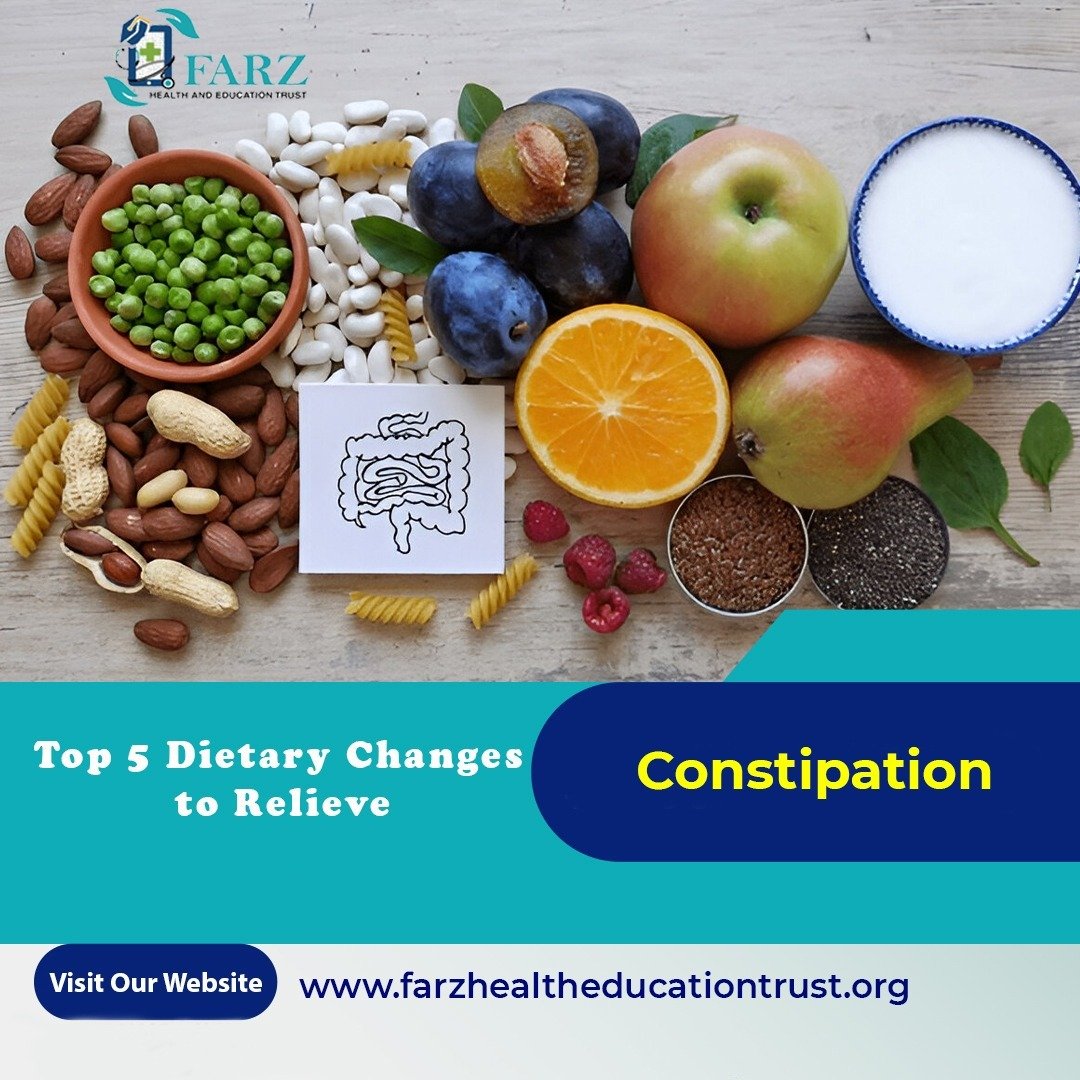
Constipation is a prevalent digestive issue affecting millions globally, causing discomfort, bloating, and difficulty in passing stools. While occasional constipation is common, chronic occurrences can significantly impact your quality of life. Fortunately, making strategic dietary adjustments can alleviate constipation and promote long-term digestive health. FARZ Health and Education Trust brings you this in-depth guide to the top five dietary changes that can help you achieve regular bowel movements and overall well-being.
Why Dietary Changes Are Essential for Relieving Constipation:
The foods you consume directly influence your digestive system’s functionality. Constipation often stems from a diet low in fiber, inadequate hydration, or excessive intake of processed foods. A balanced diet with the right nutrients can soften stool, regulate bowel movements, and foster a healthy gut environment. By incorporating these dietary changes, you can prevent constipation and improve your digestive health holistically.
1. Boost Your Fiber Intake:
Fiber is a cornerstone of digestive health, playing a crucial role in forming stool and aiding its movement through the intestines. It is categorized into two types, each offering unique benefits:
- Soluble Fiber: Dissolves in water, forming a gel-like substance that softens stool and slows digestion, allowing for better nutrient absorption. Foods rich in soluble fiber include:
- Oats
- Beans and lentils
- Apples
- Citrus fruits (oranges, grapefruits)
- Barley
- Insoluble Fiber: Adds bulk to stool and helps it move through the digestive tract efficiently. Foods high in insoluble fiber include:
- Whole grains (brown rice, whole wheat bread)
- Vegetables (carrots, celery, spinach)
- Nuts and seeds (almonds, flaxseeds)
Tip: Gradually increase fiber intake to avoid bloating. Aim for 25-30 grams daily, combining both soluble and insoluble fibers.
Advancements in Critical Care Education and Training
2. Stay Well-Hydrated:
Proper hydration is key to preventing hard stools and facilitating smooth bowel movements. Water not only softens the stool but also supports overall gut motility. Adults should aim to drink at least 8-10 glasses of water daily, though individual needs may vary.
Additional hydration tips:
- Start your morning with a glass of warm water infused with fresh lemon juice to kickstart digestion.
- Incorporate fluids like herbal teas, coconut water, natural fruit juices, and clear soups.
Hydration Reminder: If you consume more fiber, your body will require additional water to process it effectively.
3. Embrace Probiotic-Rich Foods:
Your gut is home to trillions of bacteria that influence digestion and overall health. Probiotics, the “good bacteria,” help maintain a healthy gut microbiome and combat constipation by enhancing intestinal motility.
Top Probiotic-Rich Foods:
- Yogurt: Choose plain, unsweetened varieties with live active cultures.
- Kefir: A tangy, fermented milk drink packed with beneficial bacteria.
- Sauerkraut and Kimchi: Fermented cabbage rich in probiotics and fiber.
- Miso and Tempeh: Fermented soy products, excellent for gut health.
Tip: Pair probiotic foods with prebiotic-rich options like bananas, garlic, and onions to fuel the good bacteria.
4. Incorporate Healthy Fats into Your Diet:
Healthy fats play a vital role in lubricating the intestines and aiding stool passage. Additionally, they assist in the absorption of fat-soluble vitamins (A, D, E, and K), which are essential for overall health.
Sources of Healthy Fats:
- Avocados: High in heart-healthy monounsaturated fats and fiber.
- Olive Oil: A natural lubricant for the digestive system.
- Nuts and Seeds: Almonds, walnuts, chia seeds, and flaxseeds.
- Fatty Fish: Salmon, mackerel, and sardines are rich in omega-3 fatty acids.
- Coconut Oil: Can stimulate digestion and metabolism.
Tip: Include a small portion of healthy fats in every meal to support digestion and overall well-being.
5. Minimize Processed Foods:
Processed and fast foods are often loaded with unhealthy fats, sugars, and artificial additives while being deficient in fiber. These foods slow digestion and can worsen constipation.
Examples of Foods to Limit:
- Packaged snacks (chips, crackers)
- Sugary cereals and desserts
- Frozen meals
- Fast food
- Sugary sodas and energy drinks
Instead, opt for whole, unprocessed foods such as fresh fruits, vegetables, lean proteins, and whole grains to promote digestive health.
Additional Tips to Alleviate Constipation:
While dietary changes are crucial, incorporating the following lifestyle practices can further enhance your digestive health:
- Exercise Regularly: Physical activity stimulates intestinal contractions. Aim for 30 minutes of moderate exercise, like walking or yoga, most days of the week.
- Establish a Routine: Train your body by setting a regular time for bowel movements, ideally after a meal.
- Respond to Natural Signals: Never ignore the urge to use the bathroom, as delaying can worsen constipation.
- Manage Stress: High stress levels can disrupt gut function. Practice relaxation techniques like deep breathing, meditation, or mindfulness.
The Future of Critical Care: Innovations and Emerging Trends
When to Seek Professional Help:
If constipation persists despite making these dietary and lifestyle changes, it may indicate an underlying medical condition that requires evaluation. Chronic constipation can result from issues such as irritable bowel syndrome (IBS), hypothyroidism, or certain medications. In such cases, consult a healthcare professional promptly.
Conclusion: Small Changes, Big Impact
By incorporating these five dietary changes—boosting fiber intake, staying hydrated, eating probiotic-rich foods, including healthy fats, and reducing processed foods—you can take significant steps toward relieving constipation and improving your overall digestive health. Combined with regular exercise and mindful habits, these changes pave the way for a more comfortable and healthier life.
For personalized dietary advice or to learn more about managing constipation, Call us at +91 98368 50632 to schedule an appointment. Take control of your digestive health today for a better tomorrow!
